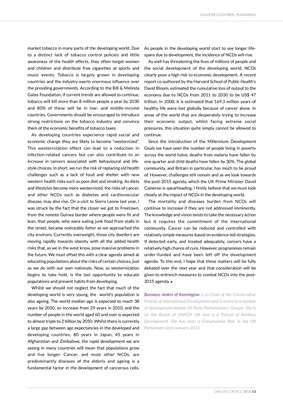
Cancer Control: How should the global target of a 25% reduction
in premature mortality from non-communicable diseases (NCDs)
by 2025 be interpreted?
Sir Richard Peto: I would define "premature death" as death
during the middle age range of 35 to 69 years. It's not that
deaths after 70 don't matter - I'm after 70 myself and I'm
still enjoying life - but if you are going to do things to reduce
NCDs then it is going to be to reduce NCD mortality in your
50s and 60s as well as reducing the death rates in your 70s
and possibly even in your 80s. In a nutshell, I would like to see
a substantial reduction in the probability of a person of 35
dying before they were 70, calculating that probability at the
death rates at 1990, 2010 and 2030. I would want just to
count those deaths from a cause which, if avoided, a person
would have had a reasonable number of years left in
expectation.
Cancer Control: Do you consider the "25 by 25" target
achievable?
Sir Richard Peto: In many populations the death rates are
actually falling, so if you are looking at global death rates,
then the rate of decrease over the period 1990-2010 is so
great that it will actually finish up knocking a quarter off
these things by 2025. Overall, things are improving. In
Britain for example at a 1970s' death rate, 42% of men in this
country would die before they were 70; now it is 18%.
Cancer Control: NCD advocates place great emphasis on the
relative burden of non-communicable diseases compared with
communicable diseases. Are they right to do so?
Sir Richard Peto: I don't like these things that say "More
people die from NCDs than from communicable disease and
therefore NCDs are more important". They seem to me
misleading because they are counting deaths in old age,
when deaths are inevitable. It doesn't seem to me to be a fair
argument, because of the ages at which people are dying.
You have to take into account the Years of Life Lost (YLL)
rather than just crude numbers of deaths, otherwise, it's not
a fair description of the way things are; of the importance of
things. In a way, I'd want to knock the number count down.
However, if you just count the deaths from NCDs in middle
age, then it gets them back into some kind of intuitively
reasonable perspective in comparison to deaths before
middle age.
Cancer Control: The post-2015 development agenda is
currently being discussed. What are the key global developments
in health care that you would wish to see happen between 2015
and 2030?
Sir Richard Peto: Obviously we need to continue to do
CANCER CONTROL PLANNING
14 CANCER CONTROL 2014
A CANCER CONTROL
INTERVIEW WITH:
SIR RICHARD PETO
Sir Richard Peto is Professor of Medical Statistics & Epidemiology at the
University of Oxford, United Kingdom. In 1975, he set up the Clincial Trial
Service Unit in the Medical Sciences Division of Oxford University, of which
he and Rory Collins are now co-directors. Professor Peto's work has included
studies of the causes of cancer in general, and of the effects of smoking in
particular, and the establishment of large-scale randomised trials of the
treatment of heart disease, stroke, cancer and a variety of other diseases.
He has been instrumental in introducing combined "meta-analyses" of
results from related trials that achieve uniquely reliable assessment of
treatment effects. He was elected a Fellow of the Royal Society of London
in 1989, and was knighted (for services to epidemiology and to cancer
prevention) in 1999.